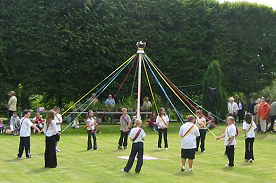I have listened to many people who have claimed to have The Truth. To be honest, when I was younger, in my arrogance I thought I knew “The truth”, when others had missed it.
However, I now think truth is quite a difficult thing to pun down. The precise definition of truth is dependant on where you are now, and where you are headed.
The picture I use is a maypole dance. Accepted that this is a pagan fertility symbol, but it still has something to teach us.

Let us assume that the maypole is the absolute undisputable truth – God’s peculiar knowledge – then we are the dancers, each holding a ribbon. While we dance, we slowly get closer to the absolute truth, but never looking directly at the truth, or moving directly towards it.
We have our personal and social perspectives, that prevent us seeing the objective truth, only the subjective. However, when we continue with life’s dance, we move around and see from different perspectives, and gradually, the ribbon plaits and we get closer and closer to the absolute truth together.
However, when one of life’s dancers insists where they know the absolute truth where they are and stands still, it breaks the dance, and nobody is able to get any closer to the pole of absolute truth, and instead the ribbons start to get tangled around the person who stands still.
Just as scientist depart from science, when they claim to know anything as Truth, so all of us must retain the humility of seeing through a glass darkly, and continue to seek enlightenment. When we insist know the absolute truth now, we simply demonstrate our folly, and cause others to get tangled too.